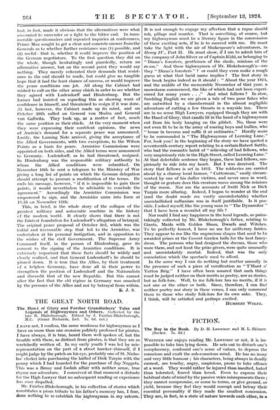THE GREAT NORTH ROAD. ,
The Hand of Glory and Further Grandfathers' Tales and Legends of Highwaymen and Others. Collected by the late R. Blakeborough. Edited by J. Fairfax-Blakeborough, M.C. (Grant Richards, Ltd. 7s. 6d. net.) I HAVE not, I confess, the same weakness for highwaymen as I have on more than one occasion publicly professed for pirates. I have always, it is true, heard them well spoken of, but the trouble with them-, as distinct from pirates, is that they are so wretchedly written of. In my early youth I was led by mis representation on the part of a street hawker- (himself, if I might judge by the patch on his eye, probably one of St. Nicho- las' clerks) into purchasing the ballad of Dick Turpin with the penny which I had hoarded for the purchase of Jap Nuggets. This was a flimsy and foolish affair with neither sense, true rhyme nor adventure. I conceived at that moment a distaste
for the High Lawyer that no subsequent reading or experience has ever dispelled.
Mr. Fairfax-Blakeborough, in his collection of stories which Constitutes a pious tribute to his father's memory has, I fear, done nothing to re-establish the highwayman in my -esteem. It is not enough to engage my affection that a rogue should rob, pillage and murder. That is something, of course, but
my highwayman must be a literary figure in the commission of these exciting acts, if he is to succeed with me. He must take the light with the air of Shakespeare's adventurers, in
Henry IV., Part IL He must show, if I am to admit him of
the company of John Silver or of Captain Kidd, as belonging to " Diana's foresters, gentlemen of the shade, minions of the moon." And these highwaymen of Mr. Blakeborough's—are they " Diana's foresters " ? or could they even make a rough guess at what that lucid name implies ? The first story in the book begins indeed as it should : " About the year 1824, and the middle of the memorable November of that year, a snowstorm commenced, the like of which had not been experi- enced for many years . . ." And what follows ? In slow, fumbling English we are given a tale of two poor fishes who are outwitted by a chambermaid in the almost negligible adventure of cutting a few throats in a wayside inn. These are in no sense High Lawyers, equipped though they are with the Hand of Glory, that candle lit in the hand of a highwayman cut from his body hanging on the gibbet. No, these were
not even fit to be in the army of roaring boys and bullies, who " bouse in taverns and ruffle it at ordinaries." Hardly more
to be commended is " The Highwayman of Leeming Lane."
For, look you! in the beginning of the story we have quoted a seventeenth-century report relating to a certain Robert Suttle, who had the 'romantic habit of " relieving of bad fellows, who very suspiciously ride in the High Street, called Leeming Lane." At that delectable sentence they began, these bad fellows, sus- piciously to ride into my heart. But I was deceived. The story that follows is set in 1812. The robberies are carried about by a clumsy local farmer, " Cutterman," easily circum- vented by one of his duller victims, and never once in word, thought or gesture does this creature move among the minions- of the moon. Nor are the accounts of Swift Nick or Dick
Turpin more alluring. Indeed, I began to wonder at the end (and the doubt made me vastly uncomfortable) whether unembellished ruffianism was in itself justifiable. Is it pos- sible, I asked myself, like the young man in " The Dynamiter " that I have been a moralist all my life ?
Nor could I find any happiness in the local legends, so pains- takingly collected by Mr. Blakeborough's father, relating to Giants, Maids with Golden Shoes, Dwarfs and Witches.
To" be perfectly honest, I have no use for unliteiary fairies. They appear to me like the ungracious shapes that used to be awarded prizes at the Covent Garden balls for the best fancy- dress. The persons who had designed the dresses, those who wore them, and not least the prize-givers, were quite unusually and. unmistakably . mortal. Indeed, that was the only consolation which the spectacle used to afford.
In the same way I can do nothing but mutter uneasily in the presence of such a piece of versification -as " T'Hunt o' Yatton Brig." I have often been assured that such things must be judged neither on their merits as poetry, nor as stories, but as folk-lore. Well, to me folk-lore has no merits, if it is not one or the other or both. Since, therefore, I can find neither poetry nor story in these verses, I can only commend them to those who study folk-lore for its own sake. They, I think, will be satisfied and perhaps excited.
; HUMBERT WOLFE.


































 Previous page
Previous page